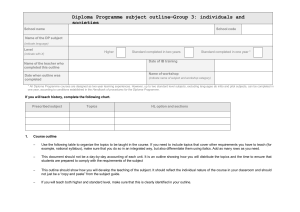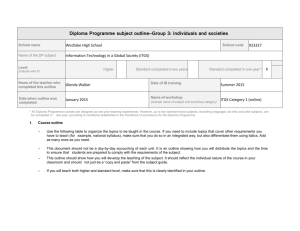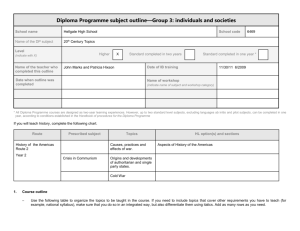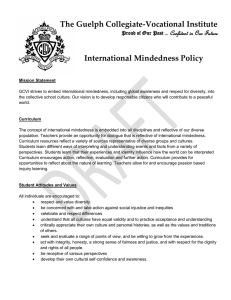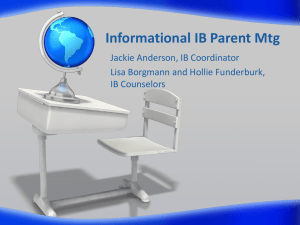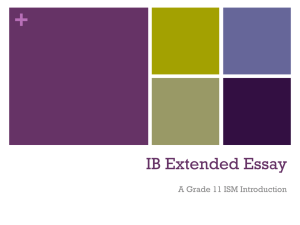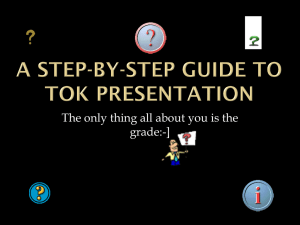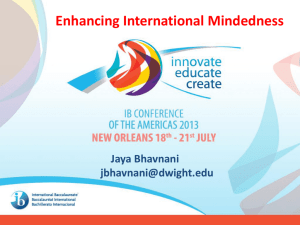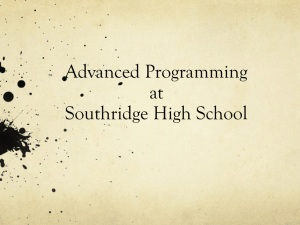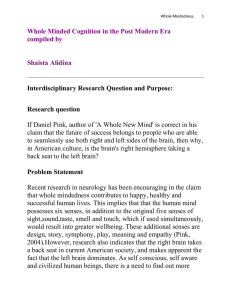indicate the language
advertisement
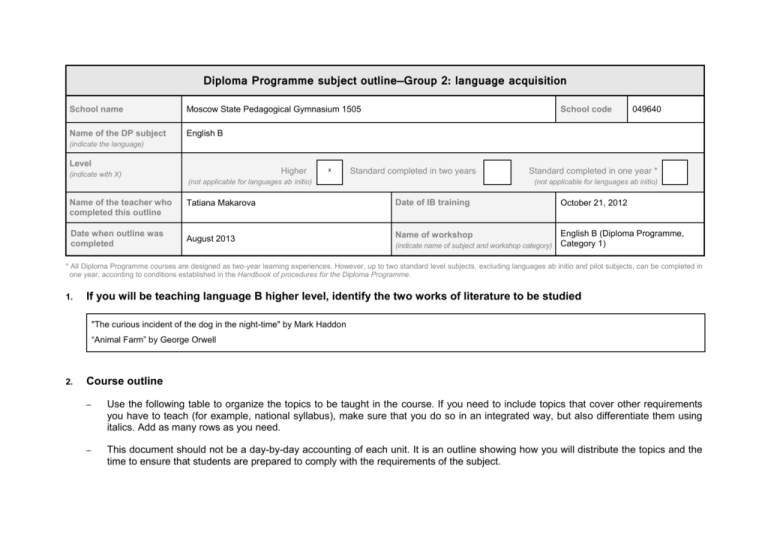
Diploma Programme subject outline—Group 2: language acquisition School name Moscow State Pedagogical Gymnasium 1505 Name of the DP subject English B School code 049640 (indicate the language) Level Higher (indicate with X) ˣ Standard completed in two years (not applicable for languages ab initio) Name of the teacher who completed this outline Date when outline was completed Standard completed in one year * (not applicable for languages ab initio) Tatiana Makarova Date of IB training August 2013 Name of workshop October 21, 2012 English B (Diploma Programme, (indicate name of subject and workshop category) Category 1) * All Diploma Programme courses are designed as two-year learning experiences. However, up to two standard level subjects, excluding languages ab initio and pilot subjects, can be completed in one year, according to conditions established in the Handbook of procedures for the Diploma Programme. 1. If you will be teaching language B higher level, identify the two works of literature to be studied "The curious incident of the dog in the night-time" by Mark Haddon “Animal Farm” by George Orwell 2. Course outline – Use the following table to organize the topics to be taught in the course. If you need to include topics that cover other requirements you have to teach (for example, national syllabus), make sure that you do so in an integrated way, but also differentiate them using italics. Add as many rows as you need. – This document should not be a day-by-day accounting of each unit. It is an outline showing how you will distribute the topics and the time to ensure that students are prepared to comply with the requirements of the subject. – This outline should show how you will develop the teaching of the subject. It should reflect the individual nature of the course in your classroom and should not just be a “copy and paste” from the subject guide. – If you will teach both higher and standard level, make sure that this is clearly identified in your outline. Topic Contents (as identified in the IB subject guide) State the topics in the order you are planning to teach them. Year 1 Allocated time One class is 45 minutes. In one week there are 5 classes. Social relationships Linguistic dominance 22 classes Communication& Media Internet, press, television and radio 22 classes Cultural diversity Subcultures 22 classes Global issues Racism, prejudice, discrimination 22 classes Social relationships Education Assessment instruments to be used 22 classes - Group discussion - Peer and self assessment - Reading comprehension/text handling activities (Paper 1) -Individual oral activities - Presentation - Vocabulary tests - Paper 2 (Personal response) - Written production (letter/article/interview/diary entry/review) - Mock exams Resources List the main resources to be used, including information technology if applicable. - English B Course Companion - David Crystal's podcasts on the disappearance and preservation of languages - Articles - BBC radio podcasts - Presentations - Extracts of TV programmes - Videos - Speeches - Blogs; Diaries - Films: The King's Speech; To kill a mockingbird; Dead Poets Society; Mona Lisa; www.filmeducation.org/ www.amnesty.eu/ Articles on www.spectacle.org/ www.ted.com Englishspeaker.com www.oyc.yale.edu/ - open Yale lectures www.dignityinschools.org/www.neo americanist.org/ Topic Contents (as identified in the IB subject guide) State the topics in the order you are planning to teach them. Year 2 Global issues Allocated time Assessment instruments to be used One class is 45 minutes. In one week there are 5 classes. Global warming & Science 13 classes Cultural diversity Migration 13 classes Health Drug abuse 13 classes Communication& Media Advertising 13 classes Health Diet and nutrition 13 classes - Group discussion; Debate; - Peer and self assessment – Reading comprehension/ text handling activities (Paper 1) - Individual oral activities - Presentation - Vocabulary tests - Paper 2 (Personal response) - Written production (letter/brochure/interview/dia ry entry/proposal/speech) - Mock exams Resources List the main resources to be used, including information technology if applicable. - English B Course Companion - Articles - Brochures/booklets - Extracts of TV programmes - Radio podcasts - The Migrant's Tale (extract from the book Journey of Misery by Kalilu Jammeh) - Film: Transpotting; Requiem for a Dream - Internet research - Blogs - Poems - Advertisements (http://adsoftheworld.com/) - Presentations www.foodchoices.com/ journals.cambridge.org/ www.myfoodmychoice.org/ www.Davidsuzuki.org/what-youcan-do/ www.ted.com www.migrationdrc.org/ 3. IB Internal and external assessment requirements to be completed during the course Briefly explain how and when you will work on them. Include the date when you will first introduce the internal and external assessment requirements, when they will be due and how students will be prepared to complete them. The students will be acquainted with both external and internal requirements at the beginning of Year 1 (September 2013). They will be informed about the deadline dates including mock exams. Mock exams are to take place in late November 2013. The topics are going to be evaluated in accordance with the objectives of assessment through a variety of oral activities (reading comprehension activities/ text handling exercises/ debates/ discussions) and written production tasks. Submission/exam dates may be revised to avoid clashes with other subjects 4. Links to TOK You are expected to explore links between the topics of your subject and TOK. As an example of how you would do this, choose one topic from your course outline that would allow your students to make links with TOK. Describe how you would plan the lesson. 5. Topic Link with TOK (including description of lesson plan) Communication& Media “What do advertisements tell us about the standards of language, culture and gender?” Advertising While studying the topic the students are encouraged to reflect upon the standards of language, culture and gender and how those standards change in course of time, the notion of political correctness and to what extent this notion is and should be applied to advertising. The students are shown some early advertisements (from the first half of the 20 th century) and encouraged to reflect upon whether those advertisements would be possible to publish in our days/ in different cultures and what the ads say about the way the standards of language, culture and gender have changed since their publication. The students discuss the issue in groups and report back to the class. Alternatively, one of the groups can be given some modern ads to consider whether they would have been possible to publish in the early 20th century. International mindedness Every IB course should contribute to the development of international mindedness in students. As an example of how you would do this, choose one topic from your outline that would allow your students to analyse it from different cultural perspectives. Briefly explain the reason for your choice and what resources you will use to achieve this goal. Topic Contribution to the development of international mindedness (including resources you will use) Health “Is it likely that different cultures have the same concepts of beauty?” Diet & nutrition “Are body image and self-esteem problems different or similar in different cultures?” Drug abuse “How is drug abuse perceived in different cultures?” “Punishment for drug trafficking in different countries (Singapore, Malaysia vs. other English-speaking countries )” The study of such issues can help students become aware of the universality of certain themes across cultures. In exploring the issues from a global perspective the students are encouraged to reflect upon their own cultural identity and appreciate a better understanding and respect for the diversity of cultural attitudes to world matters. Possible resources used are TV and radio shows, advertisements, magazine articles, documentaries. The students are also encouraged to communicate actively with peers from English-speaking countries through the means of IT (Skype, open class, edmodo) thus developing communicative skills and international mindedness. 6. Development of the IB learner profile Through the course it is also expected that students will develop the attributes of the IB learner profile. As an example of how you would do this, choose one topic from your course outline and explain how the contents and related skills would pursue the development of any attribute(s) of the IB learner profile that you will identify. Topic Contribution to the development of the attribute(s) of the IB learner profile Social relationships Having done some reading comprehension and text handling exercises on the topic, the students are asked to take part in a debate about the future of English and other languages. The activity is supposed to help the students learn how to work effectively in collaboration with others, listen effectively and respect points of view different from theirs. Thus they are encouraged to develop their communication skills and be knowledgeable and open-minded risk takers. Linguistic dominance 7. Resources Are instructional materials and other resources available in sufficient quality, quantity and variety to give effective support to the aims and methods of the courses? Briefly describe what plans are in place if changes are needed. The students will use "English B Course Companion" by Kawther Saa'd, Jeehan Abu-Awad, Tiia Tempakka, Kevin Mozley. Oxford University Press. As a class textbook. The students will have access to and be encouraged to use library resources, including data bases and partner libraries. In addition, instructional materials and other resources, e.g. Youtube videos and readings will be posted on the school platform for students to access from school and home. The classroom is equipped with a TV and I-pads will provide the students with the Internet access. In addition, the library and media lab offer space and resources for independent research.
